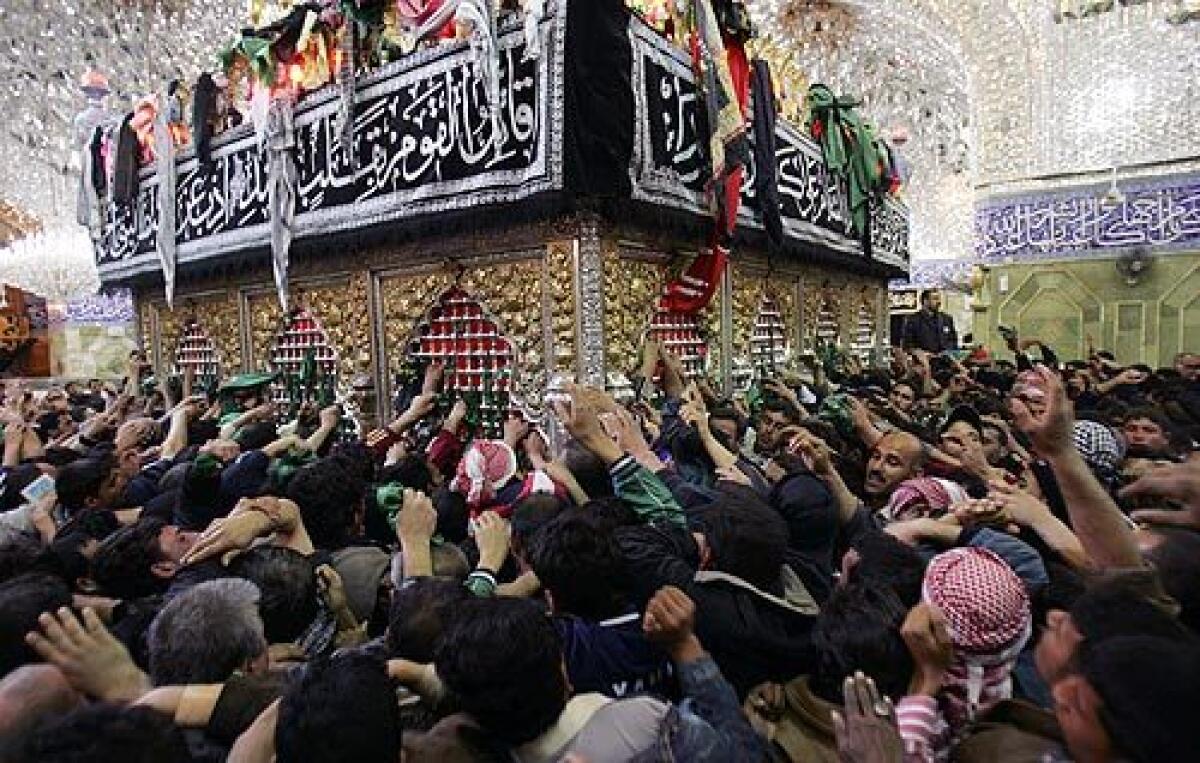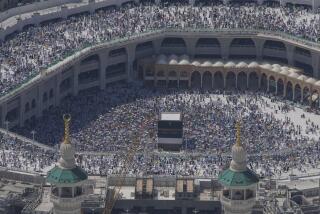Shiite pilgrims walk in devotion, defiance

- Share via
Reporting from Baghdad — A Shiite pilgrim sat on the sidewalk outside a Baghdad shrine, clad in black and holding a brown walking stick. He took off his slippers to rest his scratched and bloodied feet. Abu Zahra had just finished four days and 100 miles of walking, from Baghdad to the holy city of Karbala and back, and his feet were sore.
But he had survived. Each year, millions of Shiites make religious pilgrimages such as this one, and each year, the death toll from violence along the way can rise into the hundreds. Some are shot by gunmen in passing cars as they trek along the highways in flimsy sandals. Many more are blown up by suicide bombers trying to incite sectarian bloodshed.
Which raises the question: Why partake in an event almost guaranteed to draw attacks?
The pilgrimage Abu Zahra had just finished marked the end of the 40-day mourning period to commemorate the death of Imam Hussein in AD 680. Since Wednesday, more than 60 people have died in attacks on the pilgrims; that includes eight killed Monday in two bombings in Baghdad. Both blasts hit buses carrying Shiites returning from Karbala.
But Abu Zahra, whose nickname means “father of Zahra,” had an answer for those who wonder why he carried on.
It is love for Imam Hussein, he said as the streets around him buzzed with pilgrims filling up on free food, tea and water at stands set up especially for the occasion. “Even the babies in the cradles love him and slap their chests for him.”
No official numbers are kept on how many people take part in pilgrimages, which remain a bit of a novelty in Iraq. Under Saddam Hussein’s Sunni-dominated dictatorship, such displays of Shiite devotion were not permitted.
But since Hussein’s ouster in April 2003, pilgrimages have evolved into nationwide holidays that leave shops shuttered for days, paralyze business and cripple traffic as roads fill with pilgrims on foot, in buses and crowded on flatbed trucks. Some beat themselves bloody in ritual displays of mourning for Imam Hussein, the prophet Muhammad’s grandson, who was slain in battle in Karbala.
And the number of pilgrims continues to rise. “I’m surprised,” said Ahmad Hassan, a vendor in Kadhimiya, the Baghdad neighborhood that is the site of one of Iraq’s most revered Shiite shrines. For the first time, he said, he had seen local officials walking in the crowds, apparently no longer fearful of bombers. “In all my life I never witnessed such a thing,” he said.
Outside the capital, the crowds move along highways lined with colorful tents offering food and drinks and blasting tinny religious music from cheap speakers. It was at one such rest stop Friday that a woman blew herself up, killing at least 35 people.
For some pilgrims, the threat of violence was all the more reason to take part. Mohammed Saad dismissed the idea of fear blocking his participation. If killed, at least he would die a martyr, the college student said with a smile after three days of walking. It was his third year participating in this pilgrimage, and he estimated the crowd was twice the size of last year’s.
“My friend didn’t want to go because he said it is an exhausting journey,” Saad said. But when his friend heard about the explosion Friday, he insisted on making the trip.
Not all pilgrims trek out of defiance. Some of them see it as a religious duty that will bring rewards of good health and happiness. Yaser Ali, a taxi driver, missed four days of work to walk to Karbala and back. Saad was setting aside his studies. Umm Qais, a homemaker holding her 10-month-old baby, was exhausted but figured it was better to make the walk than sit at home, watching it live on TV.
“The explosions will not stop us,” Abu Zahra said. The construction worker had to miss a week of work but was grateful for the opportunity to walk his feet raw.
Under Hussein, Abu Zahra had served 28 years in the Iraqi army and been shot twice in his legs: once in the 1991 Persian Gulf War, and again during the 2003 U.S.-led invasion.
But at a time of increased Iraqi impatience with the American military presence, Abu Zahra was unashamed to admit that he used the pilgrimage to pray for former President Bush. “I pray for him because he freed me,” Abu Zahra said, referring to Hussein’s ouster.
He said he would make the next pilgrimage as well, perhaps even with his wife and daughter. And he told of miracles among those along the pilgrimage route.
“Let me tell you something I witnessed,” Abu Zahra said. “There was a blind man who was walking with a guide to Karbala. He slept, and in the morning he started to scream, ‘I can see!’ ”
He said he saw another man get up from his wheelchair and walk.
“They say we are crazy for doing these things,” Abu Zahra said. “I say, ‘Yes, that’s right. We are crazy in the love of Imam Hussein.’ ” He massaged his feet.
More to Read
Sign up for Essential California
The most important California stories and recommendations in your inbox every morning.
You may occasionally receive promotional content from the Los Angeles Times.











